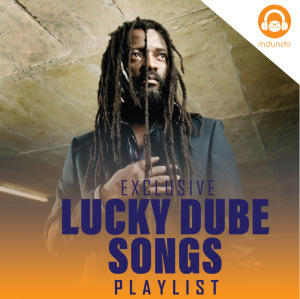
His latest albums Think About The Children/Rastas Never Die (2000) and Soul Taker (2001) were released on Gallo Records (South Africa).

Also Shanachie Records released Taxman in 1997. DJ,” and an emotional cover of Foreigner’s “I Wanna Know What Love Is,” “Prisoner,” and “Slave” to name a few. In 1996 Shanachie Records released Serious Reggae, featuring songs “Mr. He was the winner of the OKTV Award (South Africa) for Best Male Vocalist of the Year. He was the first South African to perform at Jamaica’s Reggae Sunsplash (1991) and was called for a 25-minute encore! To date, Trinity (1995), with hit songs such as “Feel Irie,” “Trinity,” “Serious Reggae Business,” and “Puppet Master,” is one of his most requested albums and was released on Motown’s Tabu Records expanding Lucky Dube’s United States audience. Since then Lucky and his band, Slave, performed all over the world. His platinum double live album Captured Live outsold any international music. His 1989 album Prisoner sold over 100, 000 copies worldwide. Although he began as an mbaqanga (traditional Zulu) music singer, Lucky Dube’s career boomed in 1987 when his third album, Slave, was released and let off massive hit singles: “Slave,” “I’ve Got You Babe,” and “Back to My Roots,” which led to a record breaking sold out performance in Johannesburg of over 50,000 people. His mother named him Lucky because he was born in poor health, but he survived. While successful reggae artists have traditionally hailed from the Island of Jamaica, over the decades of the 1980s and 1990s South African native Lucky Dube (pronounced doobay) delivered some of the most conscious and substantive roots reggae songs to hit the airwaves.ĭube became the best-selling artist in all of Africa during the 1980s and ’90s, and gained popularity in North America, the Caribbean and Europe. Dube's third reggae album, Slave, sold more than five hundred thousand copies.Your Connection to traditional and contemporary World Music, including folk, roots, global music, ethno and crosscultural fusions The album became a major hit and achieved gold record status. Without notifying his record label, Dube re-entered the recording studio and cut a second reggae album, Think About the Children. His earliest attempts with the newly adopted style were met by strong opposition by the then-all-white South African government, and his first reggae album, Rasta Never Die was banned from radio airplay. Inspired by thcontroversialal lyrics of Peter Tosh, Dube moved to reggae in 1984. Together with the group, he recorded his first single in 1979. After singing with school rock u0026 roll bands, he joined his cousin, Richard Siluma's, mbaqanga band, the Love Brothers. By the age of nine, he was conducting his school choir.

brethren musical talents were obvious from an early age. While The Village Voice observed, "The spirit of Lucky Dube's music and dance epitomizes the spirit of Black liberation", Niceup Magazine wrote, "(Dube's) lyrics have brought an original voice to reggae by chronicling the political and spiritual struggles of his South African brethren". Although he initially sang in the traditional Zulu mbaqanga style, his move to reggae in 1984 was sparked by his quest to express his anger against the oppression of apartheid.

Lucky Dube (born Ermelo Dube pronounced "doo bay") is one of South Africa's best-selling artists and one of its most outspoken performers.


 0 kommentar(er)
0 kommentar(er)
